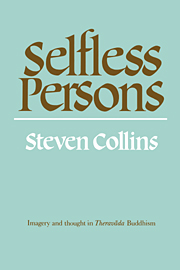Book contents
- Frontmatter
- Contents
- Dedication
- Preface
- Introduction
- Part I The cultural and social setting of Buddhist thought
- Part II The doctrine of not-self
- 3 The denial of self as ‘right view’
- 4 Views, attachment, and ‘emptiness’
- Part III Personality and rebirth
- Part IV Continuity
- Conclusion
- Notes
- Bibliography
- Glossary and index of Pali and Sanskrit terms
- General index
4 - Views, attachment, and ‘emptiness’
Published online by Cambridge University Press: 18 December 2009
- Frontmatter
- Contents
- Dedication
- Preface
- Introduction
- Part I The cultural and social setting of Buddhist thought
- Part II The doctrine of not-self
- 3 The denial of self as ‘right view’
- 4 Views, attachment, and ‘emptiness’
- Part III Personality and rebirth
- Part IV Continuity
- Conclusion
- Notes
- Bibliography
- Glossary and index of Pali and Sanskrit terms
- General index
Summary
The Apostle tells us that in the beginning was the Word. He gives us no assurance as to the end.
It is appropriate that he should have used the Greek language to express the Hellenistic conception of the Logos, for it is to the fact of its Graeco-Judaic inheritance that Western civilisation owes its essentially verbal character. We take this character for granted. It is the root and bark of our experience and we cannot readily transpose our imaginings outside it. We live inside the act of discourse, but we should not assume that a verbal matrix is the only one in which the articulations and conduct of the mind are conceivable.
In certain Oriental metaphysics, in Buddhism and Taoism, the soul is envisioned as ascending from the gross impediments of the material, through domains of insight that can be rendered by lofty and precise language, towards ever deepening silence. The highest, purest reach of the contemplative act is that which has learned to leave language behind it. The ineffable lies beyond the frontiers of the word. It is only by breaking through the walls of language that visionary observance can enter the world of total and immediate understanding. Where such understanding is attained, the truth need no longer suffer the impurities and fragmentation that speech necessarily entails.
George Steiner, ‘The Retreat from the Word’ (1967) reprinted in Steiner (1979) pp. 31ffIn this chapter, I will deal with a different aspect of the doctrine of anattā.
- Type
- Chapter
- Information
- Selfless PersonsImagery and Thought in Theravada Buddhism, pp. 116 - 144Publisher: Cambridge University PressPrint publication year: 1982

